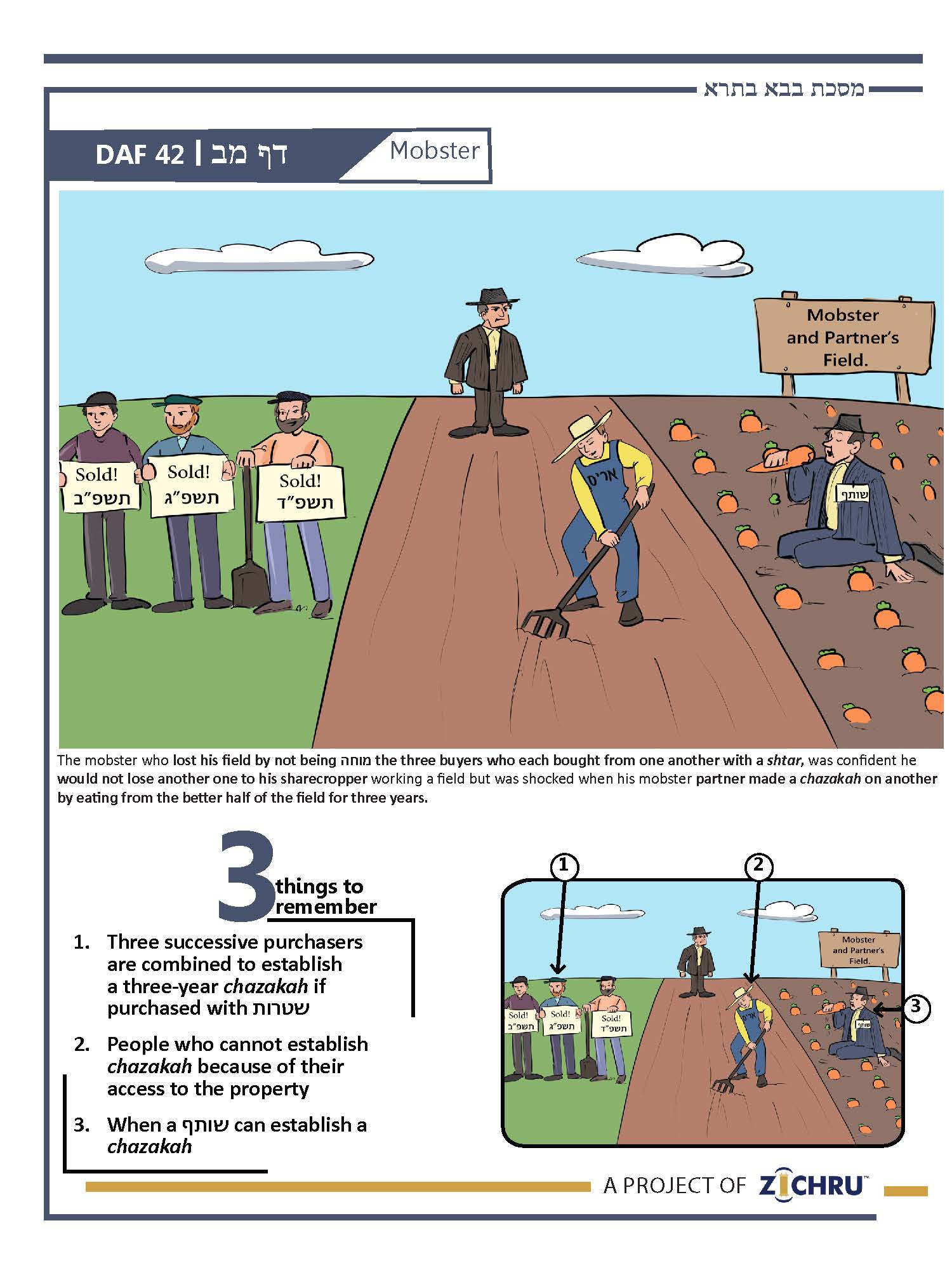Bava Basra - Daf 42
- Audio Timestamps
0:00 - The 3 Sugyos
2:54 - Review of 3 Sugyos
5:36 - Siman
7:57 - 4 Blatt Back Chazarah
16:20 - Pop Quiz (Last 7 blatt)
For access to all Zichru resources including PDFs, and illustrations CLICK HERE
- If sales or loans become public knowledge through witnesses without a שטר
On the previous Daf, the Gemara said that the usage of three successive purchasers of one field is combined to establish a three-year chazakah. We assume the מערער knew about the sales and should have protested. Rav says: וכולם בשטר – this is only if all [the purchases] were recorded in שטרות, but otherwise, we cannot assume the owner heard about them. The Gemara asks if Rav holds עדים לית להו קלא – witnesses’ testimony does not “have a voice” to become public knowledge, because Rav ruled that if one sells land in front of עדים, and the land is collected by a creditor, the buyer can collect from other property subsequently sold by the seller, presumably because those buyers were aware of this earlier purchase!? The Gemara answers: לקוחות אינהו אפסידו אנפשייהו – those purchasers caused themselves a loss by not properly investigating if there was a previous sale (because although it may not become public knowledge, it can be determined through inquiry). The Gemara asks that Rav himself said that a loan made without a שטר cannot be collected from subsequently sold land, because the purchasers were unaware of the loan!? The Gemara differentiates between loans, which are made privately (so the borrower’s properties do not lose value), and sales, which are made publicly to attract buyers.
- People who cannot establish chazakah because of their access to the property
The next Mishnah states: האומנין – Craftsmen, והשותפין – partners, והאריסין – sharecroppers, והאפוטרופין – and administrators אין להם חזקה – cannot establish a chazakah. Because they all have legitimate access to the property, their usage does not indicate ownership. לא לאיש חזקה בנכסי אשתו – A man cannot establish a chazakah in his wife’s property, since he commonly takes her property’s produce, ולא לאשה חזקה בנכסי בעלה – and a woman cannot establish a chazakah in her husband’s property, since he is obligated to support her. A father and son cannot establish a chazakah on each other’s property, because they would not protest each other’s use of their property.
- When a שותף can establish a chazakah
Shmuel’s father and Levi taught in their version of the Mishnah that a שותף cannot establish a chazakah, and certainly a craftsman cannot. Shmuel taught in his version only that a craftsman cannot establish a chazakah, but a שותף can. This contradicts another statement of his, that שותף כיורד ברשות דמי – a partner is like one who enters a field to work with permission, i.e., he is like a sharecropper who cannot establish a chazakah!? The Gemara answers: הא דנחית לכולה הא דנחית לפלגא – this statement is where [the partner] occupied the entire field, and this other statement is where he occupied half the field. There are two opposite versions explaining this answer, depending on whether partners usually prefer to receive yearly benefits, or alternate using the entire field for several years. Ravina answered that both cases refer to using the entire field, but the first case is דאית בה דין חלוקה – where [the field] is large enough that it is subject to division, where each half is usable. Here, one would not allow the other to use the entire property himself, and doing so establishes a chazakah. The second case is where the property is too small for each half to be usable, and they would commonly alternate using the entire field for several years.
Siman – Mobster
The mobster who lost his field by not being מוחה the three buyers who each bought from one another with a shtar, was confident he would not lose another one to his sharecropper working a field but was shocked when his mobster partner made a chazakah on another by eating from the better half of the field for three years.


